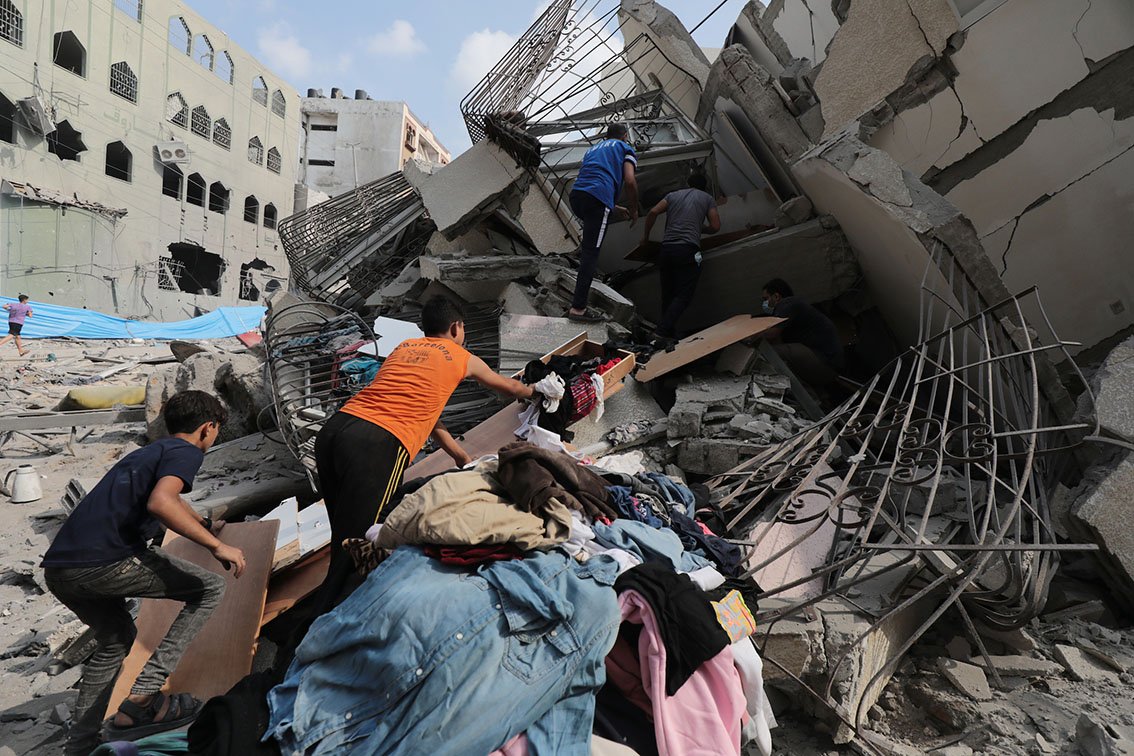“There is absolutely nowhere safe in Gaza”
October 2023
On 20th October, Embrace CEO Tim Livesey spoke to Martin Stanford at LBC Radio to give an update on the latest situation in Gaza and our partners there. You can read transcript of their conversation below.
The conversation has been edited for clarity
Martin: Local media in Egypt are expecting the Rafah border crossing will open, although there is an element of doubt in that. Aid trucks have been waiting for much of the week to get humanitarian supplies into Gaza. Tim, are your contacts able to shine any more light on this? António Guterres [Secretary General of the United Nations], was trying to get this border crossing open, do you think he might have impact where others have failed?
Tim: I think he’s a profoundly impressive person. He speaks on behalf of those who suffer in times of war. I don’t know whether he’s going to succeed. But if he doesn’t, as I think we all know, that what is already an almost indescribable catastrophe will only get worse. The need for food, for water, for fuel (fuel to pump clean water, fuel to dispose of waste) is so vital. If it doesn’t get through today, who knows what will happen next.
It is also important to remember that there is the most intense aerial bombardment, that has now been continuing for over 10 days.
Last night, the Greek Orthodox Church, one of only two churches in Gaza, was unfortunately hit.
Martin: Update us on that, where is that church located?
Tim: It’s located in Gaza City. I’ve been there myself. We support the Scout Group there. Scouts are a very important part of Palestinian life. It’s a place where youngsters gain skills. It’s also, I think, the second oldest Orthodox Church anywhere. It unfortunately was affected by a strike last night. It is almost certainly collateral damage, to use that horrible clinical term.
In the precinct of the church, about 400-500 people were sheltering, I think all of them Christians. When the strike occurred last night, there were a number of people who were killed. The damage is immense. This really came home to us because we have five partners in Gaza. One young woman, aged 26, who works for one of those partners, was killed. Her husband was killed. Her toddler was killed. Her sister was killed. Her sister’s two children were killed. We have another partner who lost both his parents and his sister is gravely injured.
It's tragedy upon tragedy because that young woman has precious little chance of receiving the kind of care that she would need because hospitals are just completely overwhelmed.
Martin: The dilemma that ordinary Gazans are facing seems extraordinary. We’ve reported the fact the Israelis said to everybody in the north should get out. Some did and found that there are no essentials for life in the south of Gaza and so they have come back. And even those who have gone to the south are still suffering bombings by the Israelis. There is literally, it would seem, no safe place to go.
Tim: There is absolutely nowhere safe in Gaza. If you’re in the south, you may be near Rafah. Rafah was bombed. You may be in Khan Unis. Khan Unis has been bombed. If you’re in the north, such as Gaza City, you’re going to be bombed or you’re going to be in the vicinity of incoming missiles. There were 100 airstrikes overnight. It’s hugely intense.
Can you imagine being a mother or a father trying to work out what is the best thing to do, where is the best place to stay. “Where can I find Safety?” Well, unfortunately, nowhere.
Martin: You’re a Christian development charity. This must challenge your faith, doesn’t it?
Tim: Yes, it does. But why I do this job is because of the people I work with – my colleagues here, but also more particularly the partners we work with (50 partners across the Middle East). These are incredible people. These are people whose faith has been tested time and time and time again and they never give up. They keep serving. Last night, in that compound, the whole of the day had been spent putting together food parcels that that community had been able to gather together in the compound. Why? Because they wanted those food parcels to go to their neighbours, including what appears to be the block of flats next door that collapsed under the impact of the strike.
They will never give up. Not only will they not give up on their faith. They won’t give up on their land. They won’t give up on their identity. That’s why they remain and unfortunately in so doing they are in grave danger. But they are enormously inspiring people. I cannot tell you how inspiring they are and so what little faith I have, even in this kind of situation, is enormously strengthened by their witness, by their courage. But yes, it is really challenging.


